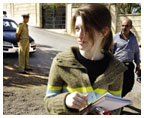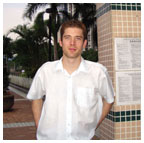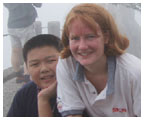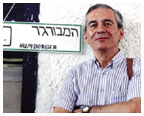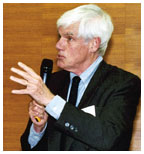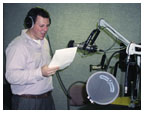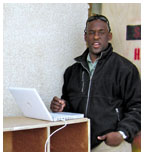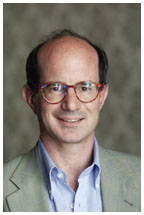
|
|
November 2, 2005: Features
Perceptions of Americans abroad
An
American in ...
Paris
Shanghai
Damascus
and other cities around the globe
Last summer, PAW asked alumni who live and work as journalists outside the United States to write about how Americans are perceived in their corners of the world. The assignment was broad: We asked the alumni to consider “how the United States and its citizens are viewed by ordinary people in other countries, and about what life is like for Americans abroad.” The journalists answered that question in very different ways. Here are some replies.
(Jeroen Kramer ) |
Syria By Katherine Zoepf ’00
Katherine Zoepf ’00 reports from the Middle East for The Chronicle of Higher Education.
Do you lie about where you’re from?
There is almost no question that I dislike more. Yet when I bump into Americans traveling in Syria, or new arrivals settling in for a stint of work in the region, this is always one of the first that they ask.
It’s inevitable, I suppose. Recently, Syria has been under intense pressure from the United States to end its influence in Lebanese politics and to stem the flow of terrorists crossing its eastern border into Iraq. In February, the United States recalled its ambassador from Damascus in protest over Syria’s alleged involvement in the assassination of former Lebanese prime minister Rafik Hariri. Relations between the U.S. and Syria, it can be said, are at their lowest point in years.
And yet, the answer is no: I never lie about where I’m from. For one thing, I’m proud to be an American, though I may not always agree with my government’s policies. But even more than that, I think that by lying, I’d be buying into an us-versus-them view of the world. I’d be treating Syrians as if they were childishly incapable of judging people as individuals. I’d be deciding that they couldn’t possibly comprehend the complexities of America’s role in their regional politics or understand what might make a young American reporter decide to make her home in their country for a time.
Syria, despite its prickly reputation and Baathist, authoritarian government, is a safe and friendly place. The Syrian sense of chivalry and hospitality is a force you literally could stake your life on. In a country where state institutions are often broken and unreliable, people rely on each other. Strangers are welcomed, the lost are put on their way again, the tired and thirsty are plied with sweet tea and cigarettes.
I get the occasional tedious lecture about what American military support for Israel means to Syria, or about how America didn’t have a good plan for Iraq after it toppled Saddam. These tend to come from well-educated, well-traveled, professorial types, and are always delivered in a manner that suggests that they are imparting startling new information that I would never have come across any other way.
But ordinary Syrians, generally speaking, are far more interested in asking about what Americans think of Syria. Nearly everyone seems to have a cousin living in Michigan or California. Most seem genuinely delighted at the unexpected chance to chat with an American visitor, or to gently correct her Arabic.
Somewhat typical is the reaction I got from a taxi driver the other day.
“Ah, American!” the driver exclaimed, when I answered his queries about where I was from. “Good people; not-so-good government.”
The driver chuckled, and winked. “Just like we have in Syria!”
![]()
(courtesy Bryan Walsh ’01) |
Thailand By Bryan Walsh ’01
Bryan Walsh ’01 is a Hong Kong-based writer for Time Asia magazine, the Asian edition of Time.
Only the recovering children can be heard crying in the Mae Tao Clinic’s makeshift pediatric ward, and they sometimes are drowned out by the fat rain drumming off the tin roof. It’s the quiet ones you have to worry about, the toddlers struck down by cerebral malaria. They lie in their mothers’ laps on the cement floor, draped in fabric, skin shrunk to their skulls, breathing shallow. The mothers make no noise, and neither do the handful of fathers, who stand helplessly against the wall with their hands behind their backs. There’s nothing anyone can do, except listen to the advice of the nurses who pick their way through the packed ward. The comparatively well-off ones wait inside makeshift mosquito nets, and seem to watch us as if through a cage, like a zoo turned inside out.
The patients are mostly Karen, an ethnic minority in Burma (also known as Myanmar) that lives in the jungle hills bordering northwestern Thailand. If few peoples in the world are worse off than the Burmese, then the Karen are the damned of the damned — decades of civil war and retribution from the army have caused hundreds of thousands to flee to the area around Mae Sot, a Thai border town. One of the original refugees, Dr. Cynthia Maung, started up the clinic out of the back of a barn with equipment she’d taken on the run with her from Burma. Today the clinic serves tens of thousands of refugees a year, and saves hundreds of lives with anti-malaria drives, volunteer jungle medics, and maternal assistance programs. The clinic even makes its own birth certificates for refugees who are officially stateless. The good that is done here is absolute.
But the reservoir of suffering seems endless, and it is that sense of helplessness that stays with me as I walk through the classrooms, the surgical ward, and the sad adult clinic where lone patients lie wrapped in their pain, no family waiting with them. The newest problem among refugees is AIDS/HIV, but the clinic has no money for antiretroviral drugs, and can do little but offer palliative care. There’s no divide in humanity like that between the sick and the well, and I know I don’t register in their dulled dark eyes, yet I can’t help sensing a shade of accusation. Why should I be walking and free, with a passport from that lucky nation, thanks simply to an accident of birth? There’s no justice in any of this, and everyone can feel it.
Back in the pediatric ward, a volunteer nurse from America sinks into
a metal chair. She was born in Burma, and fled to the United States in
the 1960s. Her three-month tour at the Mae Tao Clinic is almost finished.
“Being here, doing this work, just makes me so thankful for what
my kids have got,” she says. There’s so much good here —
only the need exceeds it. And that will always be so. ![]()
(courtesy Lucy Hornby ’95) |
China By Lucy Hornby ’95
Lucy Hornby ’95 first went to China to teach English in Wuhan through Princeton-in-Asia. She now reports for Reuters from Shanghai.
Ten years ago, I landed in Beijing’s Capital Airport and was amazed to see teams of women sweeping the long and empty highway that led through the drizzly dawn to the city. The day I moved to Shanghai last year, I checked into my hotel, turned on the television, and saw Shirley Tilghman explaining stem cell research.
Sometimes I feel like Rip Van Winkle, gawking my way through the streets after a four-year absence. Shanghai is a riot of futuristic skyscrapers, cell phones work in the subway, and a Maglev train speeds passengers at 432 kilometers an hour to the airport. When I taught English 10 years ago, chilblains reddened my students’ fingers and we propped chairs against the windows to keep out the winter rain. People stuck their heads out of buses to holler “Hello!” at my red hair. Though I basked in a warm welcome, I occasionally felt like a cross between a walking dollar sign and a zoo animal.
Now there are so many foreigners in Shanghai that no one spares a stare. Besides, they’re confident that China holds the cards to the future. At a dinner last week, my host, a metals trader, told me it’s understandable that the U.S. would invade Iraq for oil, because it was necessary to maintain the empire. In the past, America — the beautiful country — was known here as the land of riches and freedom; now it’s more common to hear Chinese say that U.S. arguments about human rights, the currency, the environment, trade, and intellectual property rights are just ways to keep China down.
In Shanghai, I feel the tide of opportunity has turned. Extended families used to turn up at airports to see young grad students head off to America; now the airplanes disgorge jetlagged American tourists and Chinese returning from the United States to make their fortunes.
During a recent hiking trip to Huangshan, a pine-clad granite range, I noticed the confidence of the Chinese hikers. Their new backpacks and digital cameras contrasted with the porters, who for $5 a trip hauled 100 pounds of laundry, watermelons, and everything else up the steep slopes. It’s easy to get complacent in this new China, where conveniences are available to anyone with money. I think that’s why I was taken aback by the vehemence of Chinese demonstrations against Japan in April. Ten thousand marchers organized through e-mail and Internet chat rooms to throw bottles at a silent embassy didn’t seem to jibe with a society that’s nuts about watching Friends on pirated DVDs. The demonstrators’ target was Japan, but there was a leitmotiv: “Why does the U.S. support Japan oppressing China?”
The demonstrators I interviewed were exhilarated that they had finally “stood up for China.” The most ardent were white-collar professionals in their late 20s and early 30s — the nationalistic post-Tiananmen generation that my students came from 10 years ago.
Like me, they have left unheated classrooms with broken windows for
cubicles with computers. I’m curious to see where we end up next.
![]()
(courtesy Joseph Hochstein ’55) |
Israel By Joseph M. Hochstein ’55
Joseph M. Hochstein ’55, a writer and editor, has lived in Tel Aviv since 1983.
“Don’t look at me like that,” a man’s voice rings out in American English. It resonates over the Hebrew buzz of a Tel Aviv shopping mall. “I’m not going to steal anything from you,” the American snaps at the manager of a newsstand that sells foreign magazines.
The newsstand manager replies in Israeli-accented English. “What’s the problem? Why must you talk this way? I didn’t say anything to you. We are brothers.” Brothers they may not be, but they are about the same age, in their late 20s or early 30s.
As people do in Israel, I butt in. I ask the American if he has been here long. He says he arrived only recently. He is on military duty. We talk for awhile. The American is black. I tell him he will find that people here don’t view skin color the way Americans do. He returns his attention to the magazine racks for a few minutes and then vanishes into the crowd.
“He thought you were staring at him,” I tell the shopkeeper, explaining that a white man staring at a black man in the United States might provoke some discomfort.
“In America, they’d think I’m white?” asks the magazine seller, whose olive skin marks him in Israel as of Mediterranean or Middle Eastern background — historically, a group that has suffered discrimination by fellow Jews of European origin. He tells me that he spent a couple of years in the States — in Seattle and California — and was not aware of racism. He was living there illegally and thought it best not to divulge his nationality. He told everyone he was Italian — which went over well with women, he adds. He loves America and would move there in a minute, he says, if he could get the immigration papers.
Elsewhere in Tel Aviv, friends and neighbors express various views of the United States and its people. Moshe, who owns a stationery store, says Americans are “freiers” — an evocative Israeli term of disapproval that is variously rendered as “suckers” or “pushovers” or “gullible victims.” Moshe explains: “They go to places where they don’t belong — Iraq, Afghanistan. They try to be the police force of the whole world. They should stay home and attend to their own problems.”
Hannah, a school administrator, finds fault with U.S. family life. Adult children move away and see their parents only once or twice a year, she says, and even college students leave home to study. Accustomed to a society where the generations are reunited every Sabbath, she sees the way Americans live as cold and fragmented.
Mazal, a beauty-shop operator and mother of a combat pilot, is impressed with the U.S. work ethic. Even the richest Americans insist that their children find jobs, she believes.
Some years ago an Israeli journalist wrote about U.S. supermarkets. What struck him was the impersonal way in which store clerks told him to have a nice day. Later, a book by a pair of cross-cultural consultants found that Israelis often see Americans as insincere, naive, superficial, too formal, lacking spontaneity, insistent on going by the book rather than improvising, and easily taken advantage of.
Mordechai, a jewelry designer who has visited 11 U.S. states, thinks differently. The first word that comes to mind when he is asked about Americans is “kind.” He adds that the Americans who visit his shop in Tel Aviv are not stingy the way French tourists are.
I tell Mordechai he is generalizing. “I know that,” he says,
smiling. ![]()
(courtesy Axel Krause *58) |
France By Axel Krause *58
Journalist and author Axel Krause *58 is an editor at Transatlantic magazine and TV5, France’s international television network. He has served as secretary general of the Anglo-American Press Association in Paris since 1993.
Being an American in Paris these days isn’t what it used to be. Arriving on a hot August day in 1962 to become correspondent for Business Week, I found myself the object of fascination, admiration, and curiosity. In those days, French leaders had little regular access to leading U.S. publications and none to our television.
Given an absence of firsthand contact with American life, it wasn’t surprising that we sensed widespread, strong, genuine, and somewhat simplistic pro-American sentiments throughout the country, epitomized by the popularity of President John F. Kennedy and his French-speaking wife, Jacqueline. Today simplistic attitudes remain, though of a different sort. Despite the French population’s great opposition to President Bush and the war in Iraq, countless interviews with the French in many areas outside Paris reveal how little they know about the United States. They rarely want to hear why so many Americans supported — and still support — the president.
Yet there are competing developments. Even the casual American visitor to France, and particularly to Paris, cannot miss the striking changes that those of us who live here see every day — part of the acceleration of France’s “Americanization.” It isn’t just the casual, American-style dress, or the popularity of American music or films — but the far more open, friendly use of English by once-surly waiters in cafés and the growing spread of U.S. fast-food operations such as McDonald’s and Starbucks.
Today, a growing swarm of curious, critical, well-informed, determined, English-speaking French students and young executives seek not only challenging, sport-related vacations in the United States, but scholarships, internships, and jobs. What’s more, CNN is easily accessible on standard French cable and satellite outlets, and students increasingly read American publications online. Young, ambitious French graduate students flock to the French offices of leading American organizations and companies.
So are the French anti-American? The answer for this resident is a nuanced, paradoxical, very French “yes and no.” Yes, the French still regularly display — call it what you will — arrogance: a sense of superiority and pride in their history and accomplishments. There is a deeply held conviction that the Bush administration should be criticized and countered in the international arena. After I appear on Sunday television talk shows to discuss the administration’s positions, I am stopped in the street by viewers; I feel compelled to explain that I was not defending the president, but trying to explain American policy in the Middle East.
Still, we always come back to an undeniable, historical fact: The United
States and France remain the only allies in the Western camp of nations
that have never fought a war against each other. American journalists
like me are still treated differently, better, and with more deference
than many others. Recently the newly appointed minister of foreign affairs,
Philippe Douste-Blazy, requested a meeting with journalists in the Anglo-American
Press Association before his first trip to Washington. Upon his return,
he sent me a letter thanking the group and hoping such encounters would
continue. “Our roles have changed over the years,” a seasoned
French diplomatic editor told me later, “but there is no doubting
that the French establishment still considers you Americans the best —
even if they won’t say so openly.” ![]()
(courtesy Dan Grech ’99) |
Argentina By Dan Grech ’99
Dan Grech ’99 is the Americas correspondent for Marketplace, the public-radio business news show.
I stepped off the bus onto a dusty highway outside Neuquén. The sun was drawing low on the scrub brush. It had taken 18 hours to get from Buenos Aires to the Zanón ceramics factory here in the Patagonian desert. I saw a sign. Zanón bajo control obrero, it read. Zanón under worker control. A knot of security guards chatted and drank maté tea near the entrance. They wore hand-wiped, grease-smeared, sweat-stained rags, the uniform of Argentina’s poor. I exhaled as I picked up my bags. Guards the world over are trained to say no; they are never a journalist’s friend.
I tried to slip past. A guard stopped me. “Who are you?” he demanded. “I’m a reporter for The Miami Herald,” I said. “I’m exploring the fallout of the country’s 2001 economic collapse. I traveled thousands of miles from home to find out what happens when workers become their own bosses.” The others stopped their conversations. It’s not every day a yanqui wanders into the plant. Inevitably, one guard asked, ¿Qué pensás de Bush? What do you think of Bush? He spit out “Bush” with a lingering burst of air, like a punctured balloon. Booosch. This was not a question so much as a probe: He was a cat pawing a captured mouse to see if it had any fight in it.
I was asked this question dozens of times during my two-year stint in Argentina as a correspondent for the newspaper. I hated the question, but not because of my politics. Questions should be asked to learn something new, not to confirm your worldview. Many Argentines, I came to find, think differently. For them, questions are affirmations. This guard really was asking, Are you with us or against us? For an American in Argentina, that’s a particularly loaded question.
In the 1990s, Argentina opened its borders, liberalized its trade rules, and privatized its state-run businesses. Even the post office fell under private control. Argentina became the golden child of the so-called Washington consensus, a U.S. push to bring market economies to Latin America. The country was flush with foreign cash. But the situation was untenable. Prices began to rise. Wages fell. An economy that had been an industrial heavyweight under Gen. Juan Domingo Perón became addicted to cheap imports. Thousands of factories shuttered. South America’s second-largest economy entered a free fall as steep as the Great Depression. And many, many Argentines blamed the United States.
The Zanón tile plant was one of the factories that closed. But in hardscrabble Patagonia, there were no other jobs. The workers refused to leave, resisting eviction and turning away police. They hired other workers who had lost their jobs to guard the factory with homemade arms. And then, one day, they restarted the kilns. They were carving out a living in a shattered country.
When I wandered into that factory on the edge of the earth, I entered
a space beyond the neat prescriptions of a failed U.S. economic policy.
I knew I was an interloper. So I weighed my response to the guard’s
question about President Bush. “My president doesn’t necessarily
reflect my views,” I said elliptically, “just as Argentine
politicians don’t always represent all of the Argentine people.”
The guard pondered my answer with a frown. Then he let out his breath
and broke into a smile yellow with disregard. He offered me some maté
tea. Suspicion and anger and a predisposition to distrust me were all
taken over by good old-fashioned Argentine hospitality. Apparently now
we were friends. ![]()
(courtesy Guy Federico) |
Iraq By James Blue ’91
James Blue ’91, a producer for ABC News Nightline, lives in London. Here, he writes about Iraq.
What is your name? Where are you from? Those are the two most common questions I get in my travels. In the past year since I have returned to a posting in London, I have reported extensively throughout the Middle East, Southeast Asia, and Africa, and it is the same refrain wherever I go. I generally reply, “My name is James and I am from America.” Coming from a black man, this response generally elicits further queries as the questioner tries to resolve my race with his or her imagination of exactly what an American is. Since I don’t carry any weapons, the first guess — military — immediately can be ruled out.
Most people are glad to meet an American, and they immediately want to show off how much they know about our country. They ask about what movies or music I like — often in an attempt to sell me pirated DVDs and CDs. This gesture is an olive branch, an attempt to connect with me on my cultural terms.
In January, I covered the Iraqi elections from Fallujah, and I met people who were delighted to interact with Americans. When we went out into the town — always in the company of the Marine civil affairs unit we were embedded with — local Iraqis would invite us into their homes and graciously offer us tea. This generosity impresses me, given the U.S. military presence in Iraq.
While in Iraq I met a Sunni family that had lost two men during the first battle for Fallujah. The family had fled the city and returned recently to vote. Parts of their house had been destroyed; family members were living under military curfew in an active war zone.
The father, Ziad, took us into his home and began a tirade against the U.S. military effort in Iraq. He wanted to know why life in his country had become so dangerous, and when Iraq would be freed from liberation. He was unequivocal in his denunciation of President Bush, the coalition forces, and the Iraqis cooperating to create the new regime, even though he wanted an Iraq free of Saddam Hussein.
In the middle of his venting, Ziad fondly recalled the time he spent studying engineering in Iowa, and the many friends he made while living in the United States. He could not understand how the Americans he knew had elected President Bush and tolerated his administration’s policies against — as Ziad saw it — the Muslim world. Despite the intensity of his anger, he considered me, perhaps the only American he had recently been in contact with, a friend.
Ziad was able to look beyond politics to see me as an individual. That
generosity of spirit makes it possible for me to go into conflict zones.
Journalists often meet people at the worst times of their lives —
in conflict and often under duress — and they befriend us, take
us in, and at times even protect us. And it is their efforts that often
make it possible for me to do my job. ![]()
(courtesy Eric Frey ’85 *86) |
Austria By Eric Frey ’85 *86
Eric Frey ’85 *86 is managing editor of the Austrian newspaper Der Standard and the author of several books on the United States.
In the fall of 1981, I arrived from Austria to study at Princeton, at a time when anger over President Reagan’s tax and social policies was running high on campus. I learned to like America and dislike the administration. I admired the optimism, the friendliness, and the deep-seated fairness of American society and wished to cure it of its ills: guns, capital punishment, zealotry, prudishness, and perhaps a lack of compassion. Twenty-five years later, I am still trying to balance my love for the United States with my awareness of its flaws. That has become much harder because the polarization of world opinion after Sept. 11 forces most of us to take sides, though the truth most probably lies in the middle.
As the author of a fairly friendly 1993 biography of Bill Clinton, and a journalist writing on international and economic issues in an Austrian daily newspaper in the 1990s, I have been attacked by some as an apologist for U.S. policy. However, when I voiced my growing dismay about the post 9/11-direction of American politics and society in a critical study about the United States titled Black Book USA, I was labeled a leading advocate of anti-Americanism in Europe. Some of my American and pro-American friends condemned me for giving comfort to the enemy — the typical European left-wing intellectual who blames the United States for everything he or she dislikes.
Yes, Iraq is a disaster, but when intelligent and educated friends argue that the daily turmoil in Baghdad is just what the Bush administration wants because it can keep the country on a war footing and produce more weapons, I feel like crying in despair. When a leading Viennese banker with plenty of U.S. experience demands that Europe has to break free of “Wall Street dominance,” I wonder how anti-Americanism can cloud such people’s economic and moral judgment. Among my students in a course on international relations, I find very few who have any sympathy for America. Too many think that Americans are naive, superficial, uneducated, and materialistic — all those stereotypes that are the hallmark of prejudice.
Will this gap close again under a new president? There are some hopeful
signs. When my paper started to publish a Monday supplement of The
New York Times articles last spring, we got about three subscription
cancellations from people who felt we gave space to an imperialist and
militarist publication — but hundreds of congratulatory letters
and a boost in newsstand sales. There are still plenty of Europeans who
love the same things American as I. ![]()

